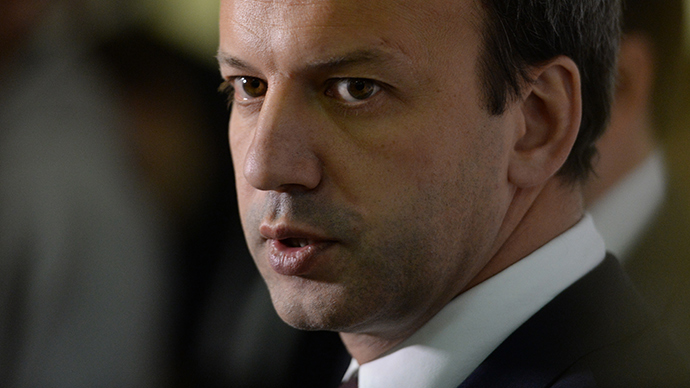No chance of state default in Russia – Deputy PM

There is no chance of a default on a state level in Russia, Russian Deputy Prime Minister Arkady Dvorkovich told RT at World Economic Forum in Switzerland, adding that the government will fulfill its obligations.
“There are no chances of a default on a state level - the government will fulfill its obligations,” Dvorkovich said in an interview to RT Wednesday. “With regard to the corporate level - it’s a market and of course some defaults are possible. Somewhere they will be technical; somewhere there will be serious problems. But the vast majority of strategic companies will cope with their problems – on their own or with the state’s help.”
READ MORE: Super rich gather in Davos to tackle shrinking economy
Russia’s economic woes have caused Western rating agencies cut the country’s debt rating to just a notch above junk status, with the fear they could put Russia to a non-investment category soon. Rating downgrades are a political issue, says Dvorkovich. It is clear there are objectively greater risks to the Russian economy and a negative forecast is possible.
“They had the right to do it, but no way can a downgrade to speculative level be justified,” he said. “Russia is a strong country, we have a solid financial system, we have successful companies. We have no grounds for large-scale defaults, these estimates are exaggerated.”
READ MORE: Fitch downgrade will have 'limited' effect on Russia
On Wednesday, Iraq’s oil minister Adel Abdul Mahdi said in Davos that oil prices have hit bottom and are not expected to drop further. Oil prices have fallen nearly 60 percent since June 2014, both WTI and Brent benchmarks are below $50.
On the issue, Dvorkovich said that the “period of low prices may last for some time, but the prices should return to the normal level.” He elaborated that of course they will not return to $110 per barrel, but he expects the prices to stabilize between $60 and $80.
Talking about the ongoing ruble crisis, Dvorkovich said one of the essential steps is to restore the trust in the national currency.
“There are two main factors in monetary policy: the fundamental reasons for changing the course. In our case they are evident,” said Dvorkovich. “It’s a low price for basic commodities, oil and gas. Another factor is associated with trust in the national currency.”
Since oil prices are gradually stabilizing, the trust factor prevails. If it’s restored, the currency will no longer see such storms in its exchange rate. “Then there’ll be no fear of further fluctuations. This is what both the government and the central bank are currently engaged in,” he said.
Negative growth in Russia is possible, but the experience of 2009 has shown that the country has every chance to quickly overcome difficulties and restore positive growth within a year, said Dvorkovich.
“We will try to avoid recession this year, although, of course, a lot is working against us. But even if we won’t be able to do this, we are sure that there are enough instruments of economic policy to ensure positive growth in the coming years,” he said.
The sanctions imposed by the west have become another reason why the Russian economy is facing complexities. Such measures have always reflected negatively on the economies against which they were imposed, on the economies which imposed sanctions, and on neighboring countries. However, Dvorkovich believes, the goal pursued by the West is impossible to achieve.
“There are difficulties with financing investments, difficulties with implementing specific technological initiatives and projects, but we seek for alternatives, we find other partners, including in the Asia-Pacific region, and are still moving forward,” he said. “Therefore, despite the sanctions, we are looking for every opportunity to improve efficiency and increase our growth potential.”
The country has accumulated substantial reserves in case of hard times, and part of them will be used to fully ensure that the government fulfills its social obligations on a number of priority projects and trends in the field of security, agriculture and in many other areas. However, less efficient spending of lower priority will be reduced, Dvorkovich said.
“Such instructions were given; the ministries have prepared a proposal, and in the coming weeks the final decision on what costs will be reduced by about 10-15 percent in different fields, will be accepted,” he said. “I hope that Parliament will support us, and we will move forward more modestly, but, nevertheless, in a situation with public finances absolutely normal for this period.”












